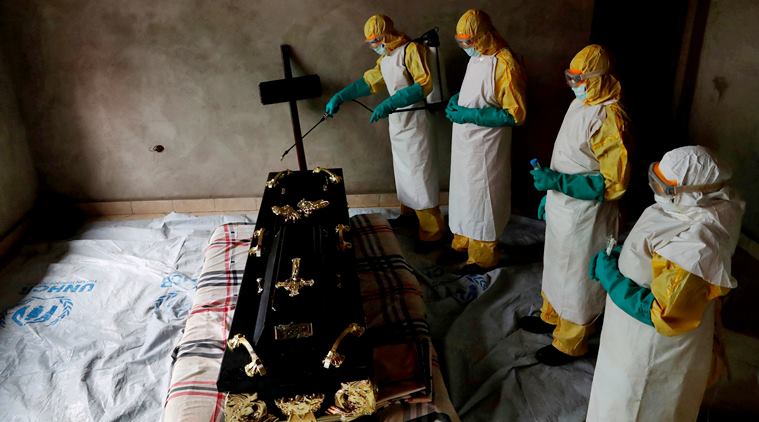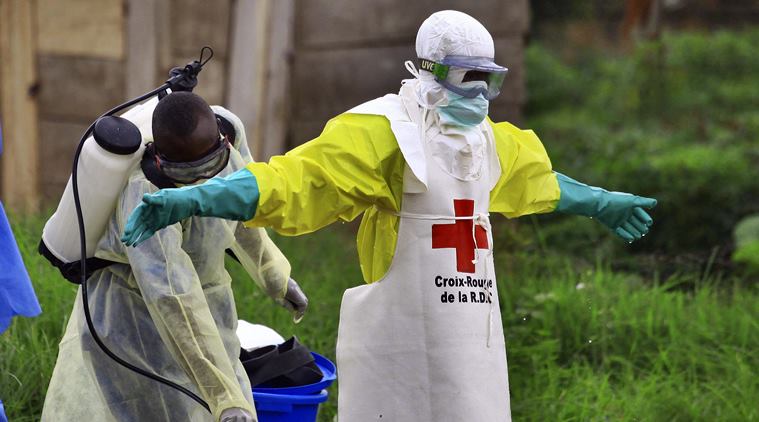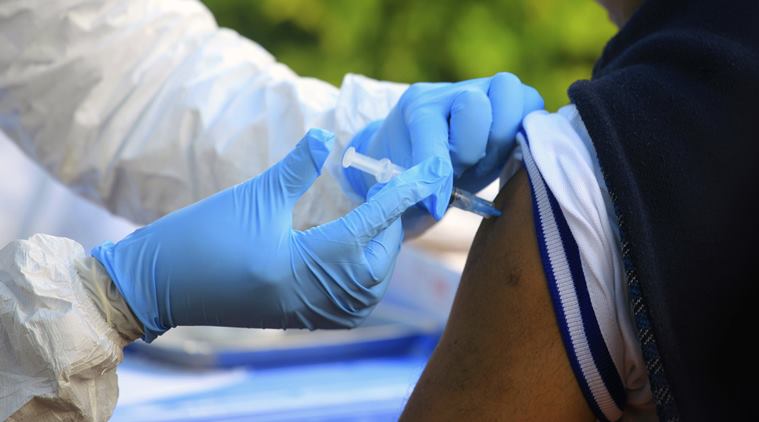Congo's health ministry reports 759 cases, including 705 confirmed ones and 414 confirmed deaths. Ebola is spread via infected bodily fluids, including those of the dead.

In this file photo, a healthcare worker sprays a room during a funeral of Kavugho Cindi Dorcas who is suspected of dying of Ebola in Beni, North Kivu Province of Democratic Republic of Congo, December 9, 2018. (Reuters)
Johannesburg: The Ebola outbreak in eastern Congo, the second deadliest in history, marks six months on Friday and is moving toward the major border city of Goma, a development that would greatly complicate any hope of stopping the virus’ spread in the unstable region.
Advertising
This may be the most challenging Ebola outbreak ever. Health workers face the threat of attack from rebel groups and resistance from frightened communities. A highly mobile population produced two scares in the past week alone: The discovery of an infected, wide-ranging young trader led to vaccinations in a new, third province near the South Sudan border. And two contacts of Ebola victims slipped away and were found in the capital of neighboring Uganda _ free of the virus.

A health worker sprays disinfectant on his colleague after working at an Ebola treatment center in Beni, Eastern Congo. (File photo/AP)
And yet this outbreak has seen a number of advances, including the widespread use of an experimental Ebola vaccine and a clinical trial of experimental treatments. Health workers say conditions have improved from the devastating West Africa outbreak a few years ago, when some patients were housed by the dozens in sweltering tents and used buckets for toilets.
By the numbers
Congo’s health ministry reports 759 cases, including 705 confirmed ones and 414 confirmed deaths. Ebola is spread via infected bodily fluids, including those of the dead.
More than 70,000 people have received the experimental Ebola vaccine, whose efficacy has yet to be determined. Some people who have received the vaccine have still fallen ill. As concerns about the vaccine stockpile grow, drugmaker Merck last week said it will ship another 120,000 doses or so to Congo by the end of this month.
Women and children make up a worrying number of cases, including more than 160 children under age 18. More than 280 children have been orphaned, the UN children’s agency says.
Cases are still emerging without any link to confirmed ones, a sign of how difficult it is to track the virus in a dense and often wary population in a region with little infrastructure. Millions of people have been checked for Ebola at border posts with Rwanda and Uganda, which the World Health Organization says are at “very high” risk.
Gunfire and rumors
“People don’t yet know what the disease is,” Dr. Brian D’Cruz with Doctors Without Borders said this week a startling comment six months into an outbreak in which health teams have hustled to combat misinformation as soon as cases appear in communities. One survivor, Aline Kahindo Mukandala, recounted for the medical charity how she and others had thought Ebola patients at treatment centers were simply zipped into body bags on arrival.

A healthcare worker from the World Health Organization gives an Ebola vaccination to a front line aid worker in Mangina, Democratic Republic of Congo. (File photo/AP)
“No, the foreigners are not here to steal our organs,” another survivor tells communities as he helps the International Committee of the Red Cross speak out in churches, markets and schools.
Ebola response workers have been attacked, both by rebels and community members. Other people fearing Ebola try to flee. Each suspension of virus containment efforts because of a security threat can lead to a jump in new cases.
The next fear
The Ebola outbreak is now a day’s drive from Goma, a city of more than 1 million people on the heavily traveled border with Rwanda. The UN says coordination of the outbreak response is already being moved to Goma, where nearly 2,000 front-line workers have received vaccinations in preparation.
.jpg)
In this file photo taken Thursday, May 31, 2018, Congolese health officials prepare to disinfect people and buildings at the general referral hospital in Mbandaka, Congo. (AP)
Some health experts have warned that the infectious disease could defeat efforts to contain it and become a permanent threat in the turbulent region, which would force already struggling health clinics to adapt their operations. Ebola response workers aim to keep a two-meter distance from those infected and ideally wear head-to-toe protective gear. How local workers would assist with childbirths, treat malaria and carry out other daily activities among North Kivu province’s estimated 7 million people remains to be seen.
And were Ebola to become entrenched there, international efforts to stop the disease would need continued resources and funding, while neighboring countries would need to make border health checks permanent to prevent the importation of cases.
- AP